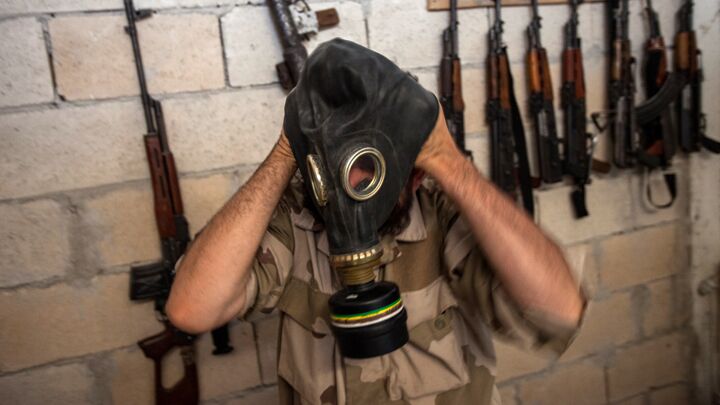
What Is Worse, Assad or His Chemical Weapons?
You can take Assad’s chemicals, but you can’t take his nature.
This fact should resonate with anyone who has watched footage of the latest chemical attack on rebels and Syrian civilians in the town of Kafr Zeita. The rebel-held village bore witness to a chemical weapons attack on April 11 that killed at least two and injured dozens more.
cnn cited one United States official saying helicopters dropped chlorine bombs onto the town. If this is true, Syrian President Bashar Assad must be behind the attack: Only his forces have the means and equipment to carry out such an attack. To date, there is no record of Jabat al Nusra or any other rebel group having acquired a helicopter.
This move is more than just a desperate attack by the regime: It is a poke in the eye to America and other nations that have been working to deescalate the conflict in Syria.
Ironically, the attack came only days before the Organization for the Prohibition of Chemical Weapons (opcw) announced that 86.5 percent of Assad’s declared chemical weapons have been shipped to the Syrian port city of Latakia to be diluted. The chemical attack may have prompted opcw to release the cheery figure, as it stated that the removal of chemical weapons was coming along with “significant acceleration.” The organization’s director general even said that the latest consignment to be delivered was encouraging.
Is that really encouraging? Even without 86.5 percent of his known chemical weapons, Assad still came up with a new way to murder civilians. Even though the international community ensured the most heinous chemicals are removed, it still failed to prevent Assad from carrying out another chemical attack! The news of the removal is good, but it doesn’t change the reality of life for the Syrian people. Assad’s actions speak louder than opcw’s words.
Chlorine was used on the April 11 attack. Because of its heavy industrial usage, it isn’t considered a weapon like sarin or mustard gas. As such, chlorine wasn’t even placed on the list of chemicals that Assad was told to give up.
https://www.youtube.com/watch?v=i6RDg1o_B5E&feature=youtu.be
Aftermath of recent gas attacks in the Syrian town of Kfar Zeita.
The problem isn’t with the chemicals, it is with the one using them. Many heads of state are firm believers that removing the chemicals will solve the problem. It won’t.
Assad has shown for years that he will use whatever he can to defeat the rebels. Consider his use of improvised barrel bombs. These drums, packed with explosives and shrapnel, are dropped from helicopters. What is the proposed solution to that? Do we create another Security Council resolution asking Assad to turn in all his barrels, nuts and bolts?
The notion is ridiculous, but no more ridiculous that the belief that simply removing the chemicals will bring about a resolution of the Syrian conflict. It merely removes one of his tools and the ability to threaten world powers with chemical strikes should they intercede further. But if the goal of the U.S. and other world powers is merely to remove the chemicals then step back, nothing is accomplished.
Assad is quite capable of fighting with the current weapons at his disposal, chlorine or otherwise. The death toll in Syria has soared somewhere over the estimated 120,000 people. Roughly 1,200 of those were killed by chemical weapon attacks. That means 99 percent of all deaths in Syria have come via non-chemical means.
This shows that removing the chemical weapons won’t be enough. Shouldn’t the international community be as vocal about the 99 percent of people being killed by non-chemical means as the 1 percent killed with chemicals? Such concepts are illusive because it would mean having to tackle an issue far more challenging than chemical weapons: It would mean having to face not only Assad’s nature, but also that of the rebels.
Bashar Assad is a ruthless dictator willing to see his own nation burn in an effort to maintain power. If all Assad had left was a stone to throw, he’d throw it. Yet the international community consoles itself by saying the situation looks “encouraging” with the progress of chemical weapons removal. It fails to recognize that the chemical weapons are just one aspect of a greater problem that is fueling both sides of the civil war.
The lust for power cannot be dealt with simply by removing chemical weapons. The attitudes of the people on both sides of the civil war must be changed. But for man to bring about such a change in his fellow man is impossible. It will take a far greater power to bring about these changes. That doesn’t mean we should look at the situation in Syria with despair—great hope can be found in what comes after the dark times we live in.
Watch Gerald Flurry’s Key of David program titled “Syria’s WMD: A Sign for Us” to understand the glorious future just ahead!
